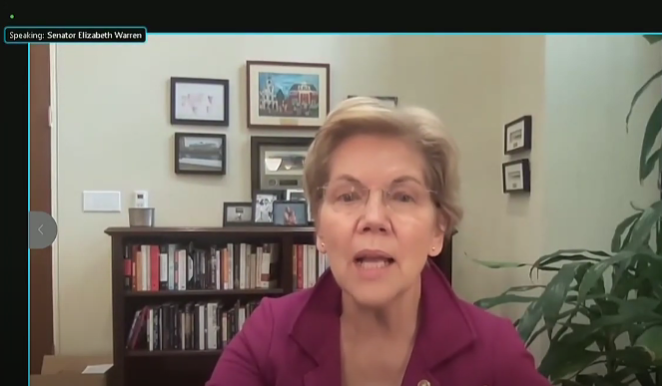In full transparency, the following is a media release from Sen. Elizabeth Warren’s office. She was elected by voters in the Commonwealth of Massachusetts to serve the state in Washington DC in the US Senate. She is a Democrat.
***
WASHINGTON DC – In a Senate Banking, Housing, and Urban Affairs Committee hearing today, United States Senator Elizabeth Warren (D-Mass.) made the case for using the government’s purse strings to help jumpstart the green economy and to meet our environmental priorities of reducing carbon emissions to help fight climate change — and witnesses agreed.
Warren’s two plans, Green Procurement and BUILD GREEN, would do exactly that.
- In response to Senator Warren, former Secretary of Energy Dr. Ernest Moniz, the current President and CEO of Energy Futures Initiative, affirmed that the federal government buying more American-made clean, renewable, and emission-free energy products for federal, state, and local use would help incentivize industries to produce these clean energy products.
- Ms. Zoe Lipman, Director of Manufacturing and Advanced Transportation at the BlueGreen Alliance, also agreed with Senator Warren that transitioning the federal vehicle fleet, including postal vans, to electric vehicles would help us meet our climate goals.

Transcript: 21st Century Communities: Capitalizing on Opportunities in the Clean Energy Economy U.S. Senate Committee on Banking, Housing and Urban Affairs Thursday, April 22, 2021
Senator Warren: Thank you, Mr. Chairman.
So, the federal government is one of the biggest purchasers of goods and services in the entire economy. Last year, we spent about half a trillion dollars for everything from lightbulbs and printer cartridges to vehicles and office buildings.
Where the federal government spends that money has a big impact on our economy. So making good use of taxpayer dollars means purchasing cost-effective products – and supporting high-quality American jobs in the process.
We have a tremendous opportunity here to use our government’s enormous purse strings to help jumpstart the green economy and to make our environmental priorities of reducing carbon emissions to help fight climate change.
Dr. Moniz, as Energy Secretary in the Obama administration, you led efforts to leverage new energy technologies to combat climate change. So, let me ask you. If the federal government bought more American-made clean, renewable, and emission-free energy products for federal, state, and local use, would that help incentivize industries to produce these clean energy products?
[broadstreet zone=”59945″]
Dr. Moniz: Absolutely, Senator. In fact, what I would really emphasize is that in doing– in following that direction, what you’re really doing is helping to make a market. And making that market then leads to the virtuous cycle of, of cost reduction as you learn in the manufacturing sector. And we should remember, we still are the largest economy in the world. We can be very, very powerful in developing those markets and then developing not just our own environmental, our own energy transition, but creating also the export capabilities that would come from making those markets.
Senator Warren: Thank you. Thank you, Dr. Moniz.
Dr. Moniz: And if I may add, it’s in addition– in addition to the products that you emphasize. And this goes back to the issues that Mr. Crabtree said as well. We also need to make the markets in the future technologies, like hydrogen, like CO2 management, which would draw on exactly the skill sets that Mr. Crabtree and his workers would do. So we need to accelerate that as well.
Senator Warren: That’s a powerfully important point. Thank you. Thank you.
[broadstreet zone=”59948″]
So, if our government commits to buying climate-friendly goods and services, I think what you’re saying is that we can leverage its massive purchasing power and our government supply chain to shift to a clean and sustainable economy.
So, the Buy Green Act that I’ve announced with Congressman Andy Levin does exactly that. It would establish a $1.5 trillion dollar in federal procurement commitments over the next decade to purchase American-made clean energy products that we can use at the federal, state, and local level, and for export.
These purchases also include something I want to drill down on a bit and that is electric vehicles.Our federal government has about 645,000 vehicles in its fleet, including over 200,000 postal service vehicles, but according to the General Services Administration, less than 1% of these vehicles are electric. Buy Green would provide the funds to electrify this fleet.
So, Ms. Lipman, let me ask you. Would transitioning the federal vehicle fleet, including the postal vans, to electric vehicles help us meet our climate goals?
Ms. Lipman: Well, certainly. You know, as you well know. And everyone on this panel. Transportation is currently our largest source of greenhouse gas emissions and the shift to electric vehicles is a key piece of meeting– addressing those emissions. And as part of that, for sure, using the– setting the example of the federal government, setting an example on the market signal to move our– those large fleets would have a huge benefit. I would also say that things like the postal service, municipal buses, and school buses also operate in local communities. So, you have a local health impact, too, in cutting emissions of toxic pollutants. But, I would just underscore as someone else did earlier that the added benefit of boosting the market for the manufacture of these technologies in America especially with Buy America and labor standards that would come with those federal purchases.
Senator Warren: Well, I appreciate that.
You know, a recent poll showed that nearly 70% of voters support using government contracts to prioritize buying American-made clean energy goods like electric vehicles and green building materials.
This kind of strong bipartisan support suggests that our country is ready for us to make big investments to bolster our clean energy economy. So I appreciate your having this hearing, Mr. Chairman. It’s time for us to put smart policies in place to save our planet and to build back greener.
[broadstreet zone=”53820″]

